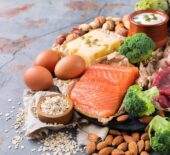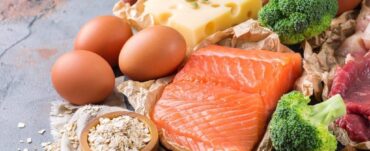When you were a child, you probably have heard at least once about the importance of getting enough calcium to help to keep your teeth and bones strong. What you may not be aware of is the importance of calcium goes beyond strong bones and teeth.
Calcium is also needed for normal muscle contractions, regulating your heart rate, and promoting normal blood clotting. On top of this calcium helps the body work optimally by helping things called enzymes and the nervous system work at their best. Another important role you may not have heard about is the role that this mighty mineral may have to help promote weight loss and achieve a healthy weight.
Research is still developing in this area but shows the potential for the use of calcium to promote weight loss and improve health markers like reducing insulin resistance. One study on adolescent boys reported that those boys with the highest amount of calcium in their diet compared to the lowest had significantly lower body weight and central adiposity. Central adiposity is a factor of importance as this is the type of fat which is centred around your organs and increases your risk of diseases such as heart disease.
Another study investigated the effects of calcium supplementation during a weight loss intervention. This study used a randomized, placebo-controlled study. 32 obese adults were selected, and the research was conducted over 24 weeks. It was concluded that for weight loss eating in a calorie deficit was the most important factor to weight loss. Secondary to this dietary calcium significantly reduced weight loss and specifically in the trunk region or central adiposity. Out of all the types of calcium containing foods dairy made the most significant effect on reducing weight.
Before you head to the supplements there are numerous studies which suggest that calcium sourced from food, especially from dairy is more effective at promoting weight loss than from supplements. This could be due to the additional weight loss promoting factors in food such as protein which helps to promote feelings of satiety.
The proposed reasoning behind how calcium assists in promoting weight loss is predicted to be due to two factors. Firstly, calcium may increase the amount of fat your body excretes and prevents it from being stored as fat. The second is that your fat cells store calcium. When your calcium levels are optimal or high, the regulation process to optimise calcium levels decreases the amount of parathyroid hormone and 1,25-hydroxy vitamin D. Parathyroid hormone and 1,25-hydroxy vitamin D promote storage of any calcium that your body is holding onto, including in your fat cells. By lowering these two factors this ultimately leads to an increased use of fat cells.
So how much dairy or dairy alternatives do you need to meet your calcium needs each day?
If you are between 13-18 years you need 3.5 servings of dairy or dairy alternatives each day.
Between 18-50 years women and men need 2.5 servings a day.
If you are a woman aged 51 years and over the serving required increases to 4 servings a day. This is because of the process of menopause and the increase likelihood of developing osteoporosis as the hormones change in a woman’s body.
When men reach the age of 71 years their needs increase to 3.5 serves of dairy or dairy alternatives each day to meet their calcium needs.
What makes up a serving?
- 200g of yoghurt.
- 250ml of cow’s milk.
- 40g of hard cheese like cheddar.
- 1/2 cup of ricotta or cottage cheese.
- 1/2 cup of evaporated milk.
Dairy alternatives to meet your calcium needs include:
- 250ml of fortified soy, rice, or other cereal drinks. Look for fortified (or added calcium) of at least 100g per 100ml. You can find this usually on the rightest panel of a carton
- 1/2 cup or 100g of salmon with bones
- 60g Sardines
- 100g firm Tofu
- 100g almonds (almonds are about 1g each and very energy dense, so be mindful when choosing this option)
Take home message: If you are struggling to win the battle for sustained weight loss, getting enough calcium each day may be the missing link you are forgetting. While it is not a magic bullet and overall calorie deficit is needed this additional factor may help put the odds in your favour for weight loss. On top of this calcium may also reduce your risk of other diseases such as heart disease and type two diabetes by reducing central adiposity and promoting reduced insulin sensitivity.
References
1. Council NHaMR. Nutritient Reference Values Australia and New Zealand Australia: Commonwealth of Australia; 2005 [cited 2015 8/8/2015]. Available from: https://www.nrv.gov.au/nutrients/vitamin-d.
2. Australia O. Vitamin D Australia: Oesteoporosis Australia; 2014 [updated 2014; cited 2015 10/8/2015]. Available from: http://www.osteoporosis.org.au/.
3. Australian guide to healthy eating. Journal of the Home Economics Institute of Australia. 2013;20(1):7. https://www.nrv.gov.au/nutrients/calcium
4. Council NHaMR. Nutritient Reference Values Australia and New Zealand Australia: Commonwealth of Australia; 2005 [cited 2015 8/8/2015]. Available from: https://www.nrv.gov.au/nutrients/calcium.
5. Jürimäe J, Mäestu E, Mengel E, Remmel L, Purge P, Tillmann V. Association between Dietary Calcium Intake and Adiposity in Male Adolescents. Nutrients. 2019 Jun 27;11(7):1454. doi: 10.3390/nu11071454. PMID: 31252547; PMCID: PMC6682862.
6. Shapses SA, Heshka S, Heymsfield SB. Effect of calcium supplementation on weight and fat loss in women. J Clin Endocrinol Metab. 2004 Feb;89(2):632-7. doi: 10.1210/jc.2002-021136. PMID: 14764774; PMCID: PMC4010554.
7. Zemel MB, Thompson W, Milstead A, Morris K, Campbell P. Calcium and dairy acceleration of weight and fat loss during energy restriction in obese adults. Obes Res. 2004 Apr;12(4):582-90. doi: 10.1038/oby.2004.67. PMID: 15090625.








